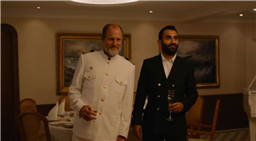The titular Triangle Of Sadness in previous Palme D’Or winner Ruben Ostlund’s current Cannes competition entry, we’re told, is the small space between the eyebrows and the bridge of the nose where nasty, aging lines register an accumulation of inconvenient emotions that, quite frankly, don’t sell a suit on the catwalk. “Do you think he needs Botox?,” mutters a model casting agent as Carl (Harris Dickinson) — who, being on the wrong side of 20, should worry — struts his stuff. He will soon find himself at a fashion show where a huge neon screen announces “Everyone is equal!” That’s nonsense, obviously. Carl can’t even find a seat.
This takedown of the fashion biz acts as a preface to Triangle Of Sadness. It culminates in an argument between Carl and his girlfriend Yaya (Charlby Dean) — also a model — over who is paying for dinner. Yaya earns much more than he does, but expects him to pick up the check. “What if I fell pregnant and couldn’t work?,” she reasons when he protests that he wants an equal relationship. “I need to know the person I’m with is going to take care of me.” But that, as she will discover in the next couple of chapters, is never a reliable assumption.
Related Story
On The Road To Cannes, Paapa Essiedu Can't Take His Foot Off The Gas — Ones To Watch
Triangle Of Sadness is a mission statement about equality: that it doesn’t exist, that it cannot exist, that while calamity may bring the downfall of the top dogs, new curs will replace them and behave in exactly the same way. Ostlund’s Palme winner The Square was certainly hard on its characters; a sharp satire of the art world, it scratched away at the contradictions between the genial left-wing pieties of the cultural establishment and its reliance on unsavory capitalism for funds. It told us that these people — people like us, people like Ostlund — were not as decent as they thought, as illustrated in series of wry twists. You had to smile.
There are no such contradictions in Triangle Of Sadness. It is set on a luxury yacht cruising somewhere sunny. This is a business unambiguously all about cosseting the very rich, supported by the rigid hierarchy of shipboard life. Top of the pile, of course, are the customers who can afford to demand anything they want. There is a British couple who made their money from land mines, a drunken Russian oligarch traveling with both his wife and his mistress who made his money by cornering the fertilizer business in Eastern Europe; and a Swedish code writer who struck it lucky by writing code for gaming. Carl and Yaya, having survived their tiff over the restaurant bill, are probably the poorest passengers on board; Yaya is a major influencer and they are cruising for free.
Next level down the food chain is the crew. Chief steward Paula (Vicki Berlin, in a sprightly performance) gives high-rev talks to her bright, white young staff, telling them to keep smiling and always say yes. Paula effectively runs the show while the captain (Woody Harrelson) refuses to leave his cabin, where he listens to the Red Army choir singing the Internationale and self-medicates. When he finally emerges, he is leaning like the Tower of Pisa. He hasn’t forgotten his Lenin, though, which stands him in good stead in an amiable slanging match with the fertilizer king.
Then there are the people below decks, who keep the boat moving and elaborate meals zipping up to the dining room. They’re all brown. When a storm comes and the guests start a volley of criss-crossing projectile vomiting — a gross-out comic scene that makes anything in Judd Apatow’s portfolio look maidenly — the brown people clean that up too. And while they may not be able to do much when pirates attack and the yacht goes down, the few survivors whose life rafts make it to a beach — who include our beautiful models, along with oligarch and the coding billionaire — find themselves entirely dependent on one of those anonymous brown people. She knows how to fish, how to make a fire, how to find edible plants and how to survive. She becomes leader, so now she can have what she wants. Whatever she wants.
Being stranded on a deserted island: it’s one of the founding myths of Western literature. It can be about finding bliss (The Odyssey), showing stoic courage (Robinson Crusoe), how vile people really are once they are no longer constrained by the rules (Lord of the Flies) or how even a volleyball can be a friend (Castaway). For Ostlund, the beach where his survivors wash up is a fishbowl where betrayals and selfishness, the real stuff of life, can be seen for what they are. I suspect Ostlund thought it would be rather more fun. As it is, Triangle Of Sadness is bitter, clever and absolutely on the money.
Must Read Stories
Jeremy Renner To Lead Sackler Drama; Ukraine Protester On Red Carpet; Reviews
‘Downton Abbey: A New Era’ Pulls In Older Crowd With $18M+ Bow; ‘Doctor Strange’ No. 1
New Details About Inappropriate-Behavior Claims On Set Of Netflix Series
Netflix Renews Buzzy Half-Hour Freshman ‘Heartstopper’ For Two More Seasons
Read More About:
Source: Read Full Article




